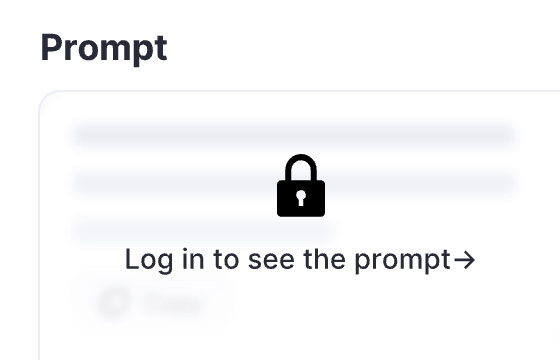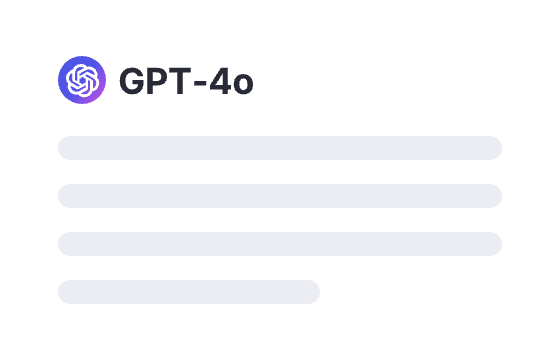575 users had unlocked the prompt
Make ChatGPT Your Mindset Coach
Unlock your potential with ChatGPT as your mindset coach—transform thoughts, boost motivation, and embrace a growth mindset today!
MidjourneyDall·eStable DiffusionGPTClaudeGeminiHealthWritingGeneralResearchCodingTeachingMusicGameJobPaid AdsIT
Sign in to try online
Prompt
🔒 Log in to see the prompt →
I would like you to read these books and keep them on file and use them to help me learn faster and be more productive Learning Faster The Art of Learning: An Inner Journey to Optimal Performance by JOSHUA WAITZKIN In this book, Waitzkin draws on experiences from his chess career and martial arts practice to present a range of methods and techniques to make your brain work harder, faster and more effectively. Select key ideas: The key to pursuing excellence is to embrace an organic, long-term learning process, and not to live in a shell of static, safe mediocrity. Usually, growth comes at the expense of previous comfort or safety. Growth comes at the point of resistance. We learn by pushing ourselves and finding what really lies at the outer reaches of our abilities. If I want to be the best, I have to take risks others would avoid, always optimizing the learning potential of the moment and turning adversity to my advantage. That said, there are times when the body needs to heal, but those are ripe opportunities to deepen the mental, technical, internal side of my game. When aiming for the top, your path requires an engaged, searching mind. You have to make obstacles spur you to creative new angles in the learning process. Let setbacks deepen your resolve. You should always come off an injury or a loss better than when you went down. …successful people shoot for the stars, put their hearts on the line in every battle, and ultimately discover that the lessons learned from the pursuit of excellence mean much more than the immediate trophies and glory. — JOSHUA WAITZKIN The Laws of Simplicity by JOHN MAEDA In this book, Maeda shares ten laws of simplicity for business, technology, and design that teach us how to need less but get more. Notable quotes: Simplicity is about subtracting the obvious and adding the meaningful. The best art makes your head spin with questions. Perhaps this is the fundamental distinction between pure art and pure design. While great art makes you wonder, great design makes things clear. The best designers in the world all squint when they look at something. They squint to see the forest from the trees-to find the right balance. Squint at the world. You will see more, by seeing less. — JOHN MAEDA Make It Stick: The Science of Successful Learning by PETER C. BROWN, HENRY L. ROEDIGER II, and MARK A, McDANIEL In this book, authors Peter Brown and psychology researchers Henry Roediger and Mark McDaniel collected and synthesized tools, strategies and stories to help students, teachers and trainers learn more effectively based on 10 years of collaboration between 11 cognitive psychologists. Select key ideas: Trying to solve a problem before being taught the solution leads to better learning, even when errors are made in the attempt. Practice that’s spaced out, interleaved with other learning, and varied produces better mastery, longer retention, and more versatility. But these benefits come at a price: when practice is spaced, interleaved, and varied, it requires more effort. You feel the increased effort, but not the benefits the effort produces. Learning feels slower from this kind of practice, and you don’t get the rapid improvements and affirmations you’re accustomed to seeing from massed practice. Many teachers believe that if they can make learning easier and faster, the learning will be better. Much research turns this belief on its head: when learning is harder, it’s stronger and lasts longer. It’s widely believed by teachers, trainers, and coaches that the most effective way to master a new skill is to give it dogged, single-minded focus, practicing over and over until you’ve got it down. Our faith in this runs deep, because most of us see fast gains during the learning phase of massed practice. What’s apparent from the research is that gains achieved during massed practice are transitory and melt away quickly. It’s not just what you know, but how you practice what you know that determines how well the learning serves you later. The act of retrieving learning from memory has two profound benefits. One, it tells you what you know and don’t know, and therefore where to focus further study to improve the areas where you’re weak. Two, recalling what you have learned causes your brain to reconsolidate the memory, which strengthens its connections to what you already know and makes it easier for you to recall in the future. — PETER C. BROWN, HENRY L. ROEDIGER II, and MARK A, McDANIEL Mindshift: Break Through Obstacles to Learning and Discover Your Hidden Potential by BARBARA OAKLEY Mindshift reveals how we can overcome stereotypes and preconceived ideas about what is possible for us to learn and become. …whatever you’re learning, see whether you can make a metaphor to help yourself understand the most difficult topic — you’ll be surprised at how much it can bring the key idea to life. Complex training environments such as action video game play may actually foster brain plasticity and learning. …research has shown that there is a countercorrelation between school grades and creativity. The better your grades, in other words, sometimes means the worse your creativity. — BARBARA OAKLEY Ultralearning: Master Hard Skills, Outsmart the Competition, and Accelerate Your Career by SCOTT H. YOUNG Ultralearning offers nine principles to master hard skills quickly. This is the essential guide to future-proof your career and maximize your competitive advantage through self-education. Learn a new talent, stay relevant, reinvent yourself, and adapt to whatever the workplace throws your way. Notable quotes: By taking notes as questions instead of answers, you generate the material to practice retrieval on later. Your deepest moments of happiness don’t come from doing easy things; they come from realizing your potential and overcoming your own limiting beliefs about yourself. Directness is the practice of learning by directly doing the thing you want to learn. Basically, it’s improvement through active practice rather than through passive learning. The phrases learning something new and practicing something new may seem similar, but these two methods can produce profoundly different results. Passive learning creates knowledge. Active practice creates skill. Beyond principles and tactics is a broader ultralearning ethos. It’s one of taking responsibility for your own learning: deciding what you want to learn, how you want to learn it, and crafting your own plan to learn what you need to. You’re the one in charge, and you’re the one who’s ultimately responsible for the results you generate. If you approach ultralearning in that spirit, you should take these principles as flexible guidelines, not as rigid rules. Learning well isn’t just about following a set of prescriptions. — SCOTT H. YOUNG Mastery by ROBERT GREENE In this book, Greene reveals how you can shift your mindset to achieve long-term success in new pursuits. Drawing on real-life examples from sports, psychology and mindfulness teachings, the book explains the five essential elements for achieving mastery in any discipline and give us the tools we need to bounce back from pitfalls along the way. Notable quotes: There are two kinds of failure. The first comes from never trying out your ideas because you are afraid, or because you are waiting for the perfect time. This kind of failure you can never learn from, and such timidity will destroy you. The second kind comes from a bold and venturesome spirit. If you fail in this way, the hit that you take to your reputation is greatly outweighed by what you learn. Repeated failure will toughen your spirit and show you with absolute clarity how things must be done. If we experience any failures or setbacks, we do not forget them because they offend our self-esteem. Instead we reflect on them deeply, trying to figure out what went wrong and discern whether there are any patterns to our mistakes. The future belongs to those who learn more skills and combine them in creative ways. People around you, constantly under the pull of their emotions, change their ideas by the day or by the hour, depending on their mood. You must never assume that what people say or do in a particular moment is a statement of their permanent desires. No one is really going to help you or give you direction. In fact, the odds are against you. Become who you are by learning who you are. You must understand the following: In order to master a field, you must love the subject and feel a profound connection to it. Your interest must transcend the field itself and border on the religious. The conventional mind is passive — it consumes information and regurgitates it in familiar forms. The dimensional mind is active, transforming everything it digests into something new and original, creating instead of consuming. — ROBERT GREENE Brain Rules: 12 Principles for Surviving and Thriving at Work, Home, and School by JOHN MEDINA In this book, Medina gives you insight into how our brains function and explains how you can take advantage of such knowledge to push your brain to work better. From gaining more productivity at work to absorbing more at school, mastering the “brain rules” will help make learning with all your senses become second nature. Select key ideas: If you wanted to create an education environment that was directly opposed to what the brain was good at doing, you probably would design something like a classroom. If you wanted to create a business environment that was directly opposed to what the brain was good at doing, you probably would design something like a cubicle. And if you wanted to change things, you might have to tear down both and start over. The problem in today’s economy is that people are typically starting a family at the very time they are also supposed to be doing their best work. They are trying to be productive at some of the most stressful times of their lives. What if companies took this unhappy collision of life events seriously? They could offer Gottman’s intervention as a benefit for every newly married, or newly pregnant, employee. We must do a better job of encouraging lifelong curiosity. Studies show that a person who is interrupted takes 50 percent longer to accomplish a task. Not only that, he or she makes up to 50 percent more errors. Emotionally charged events are better remembered — for longer, and with more accuracy — than neutral events. How People Learn. If you want people to be able to pay attention, don’t start with details. Start with the key ideas and, in a hierarchical fashion, form the details around these larger notions. Meaning before details. here are two ways to beat the cruelty of a harsh environment: You can become stronger or you can become smarter. — JOHN MEDINA Deep Work: Rules for Focuses Success in a Distracted World by CAL NEWPORT Deep work by Cal Newport is a timely reminder of the value of deep, focussed work and the dangers of losing yourself in the shallows of entertainment and distraction. Actionable ideas: If you don’t produce, you won’t thrive — no matter how skilled or talented you are. Two Core Abilities for Thriving in the New Economy 1. The ability to quickly master hard things. 2. The ability to produce at an elite level, in terms of both quality and speed. Develop the habit of letting small bad things happen. If you don’t, you’ll never find time for the life-changing big things. — Tim Ferris …trying to squeeze a little more work out of your evenings might reduce your effectiveness the next day enough that you end up getting less done than if you had instead respected a shutdown. — CAL NEWPORT Mindset: The New Psychology of Success by CAROL S. DWECK In this book, Dweck shows how success in school, work, sports, the arts, and almost every area of human endeavor can be dramatically influenced by how we think about our talents and abilities. People with a fixed mindset — those who believe that abilities are fixed — are less likely to flourish than those with a growth mindset — those who believe that abilities can be developed. Mindset reveals how great parents, teachers, managers, and athletes can put this idea to use to foster outstanding accomplishment. Select notable quotes: He didn’t ask for mistake-free games. He didn’t demand that his players never lose. He asked for full preparation and full effort from them. “Did I win? Did I lose? Those are the wrong questions. The correct question is: Did I make my best effort?” If so, he says, “You may be outscored but you will never lose. We like to think of our champions and idols as superheroes who were born different from us. We don’t like to think of them as relatively ordinary people who made themselves extraordinary. no matter what your ability is, effort is what ignites that ability and turns it into accomplishment. Why waste time proving over and over how great you are, when you could be getting better? Why hide deficiencies instead of overcoming them? Why look for friends or partners who will just shore up your self-esteem instead of ones who will also challenge you to grow? And why seek out the tried and true, instead of experiences that will stretch you? The passion for stretching yourself and sticking to it, even (or especially) when it’s not going well, is the hallmark of the growth mindset. This is the mindset that allows people to thrive during some of the most challenging times in their lives. True self-confidence is “the courage to be open — to welcome change and new ideas regardless of their source.” Real self-confidence is not reflected in a title, an expensive suit, a fancy car, or a series of acquisitions. It is reflected in your mindset: your readiness to grow. — CAROL S. DWECK The Talent Code by DANIEL COYLE Whether you’re coaching soccer or teaching a child to play the piano, writing a novel or trying to improve your golf swing, this revolutionary book shows you how to grow talent by tapping into a newly discovered brain mechanism. Drawing on cutting-edge neurology and firsthand research gathered on journeys to nine of the world’s talent hotbeds — from the baseball fields of the Caribbean to a classical-music academy in upstate New York — Coyle identifies the three key elements that will allow you to develop your gifts and optimize your performance in sports, art, music, math, or just about anything. Notable quotes: The sweet spot: that productive, uncomfortable terrain located just beyond our current abilities, where our reach exceeds our grasp. Deep practice is not simply about struggling; it’s about seeking a particular struggle, which involves a cycle of distinct actions. …Don’t look for the big, quick improvement. Seek the small improvement one day at a time. That’s the only way it happens — and when it happens, it lasts… Although talent feels and looks predestined, in fact we have a good deal of control over what skills we develop, and we have more potential than we might ever presume to guess. Try again. Fail again. Fail better. — Samuel Beckett You will become clever through your mistakes. — German proverb Deep practice feels a bit like exploring a dark and unfamiliar room. You start slowly, you bump into furniture, stop, think, and start again. Slowly, and a little painfully, you explore the space over and over, attending to errors, extending your reach into the room a bit farther each time, building a mental map until you can move through it quickly and intuitively. — DANIEL COYLE
Add to Prompt Library
Discover More Prompts

How to Use Prompt?
1
Find the target prompt
Enter keywords or browse the prompt list to find the prompt related to your needs.

2
View prompt details
After registering or logging in (it's free!), view the prompt details, including prompt content, and results.

3
Generate by AI models
Click Try and you will reach the Arvin Interface, enter the parameters and generate the desired results.
